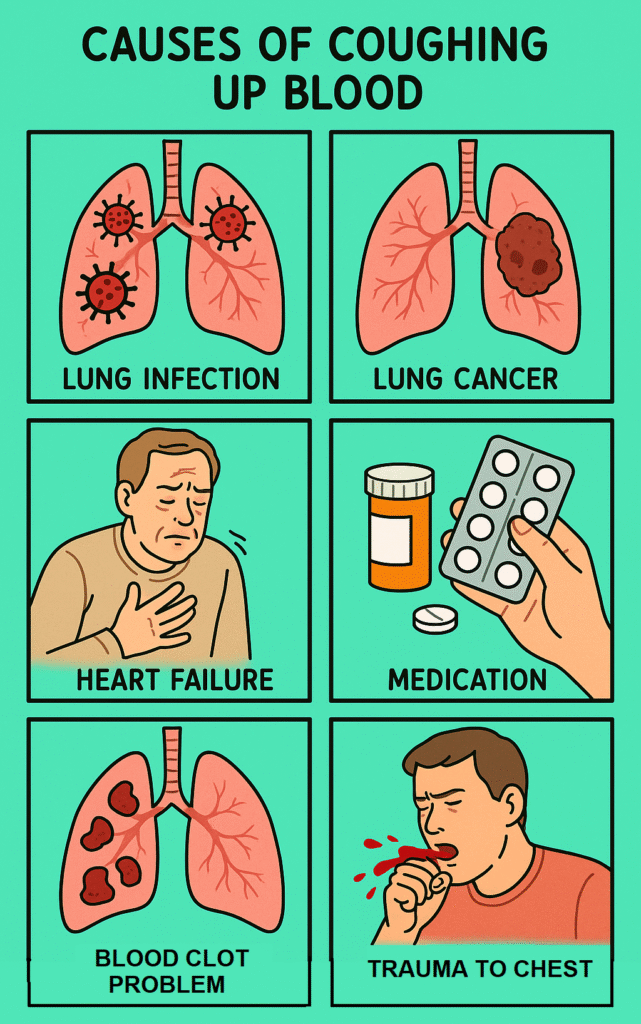What Is Coughing Up Blood?
Coughing up blood—also known as hemoptysis—can be an alarming experience. It’s when blood appears in your sputum (mucus or phlegm) when you cough. Sometimes, it looks like streaks of red in mucus. Other times, it can appear as bright red clots.
While it can be caused by something relatively minor (like a throat infection), it may also signal a more serious problem involving the lungs or airways. In fact, studies show that up to 10–15% of cases are linked to potentially life-threatening conditions like lung cancer or tuberculosis.
So when should you worry? Let’s break it down.
How Does It Happen?
Imagine your lungs like a tree, branching into tiny tubes called bronchi and bronchioles. These airways are lined with blood vessels and soft tissue. When they get inflamed, injured, or infected, the delicate blood vessels can break—causing blood to leak into your airways and be coughed out.
The source of bleeding could be:
- Upper airways (nose, throat, or mouth)
- Lower respiratory tract (bronchi, lungs)
- Or even the stomach (which actually isn’t true hemoptysis but vomiting blood)
It’s crucial to distinguish between these possibilities, as treatments vary greatly.
What Causes Coughing Up Blood?
There are many possible causes of hemoptysis, ranging from mild to severe.
Here’s a general overview:
🔹 Infections (Most Common Cause)
- Bronchitis (both acute and chronic)
- Pneumonia
- Tuberculosis (TB) – especially in countries where TB is still common
These account for over 60% of cases, particularly in people with a history of smoking or lung disease.
🔹 Lung Diseases
- Chronic Obstructive Pulmonary Disease (COPD)
- Bronchiectasis – damaged, widened airways that bleed easily
- Pulmonary embolism – a blood clot in the lungs
- Lung cancer – especially in older adults who smoke
🔹 Heart Conditions
- Mitral valve stenosis – a heart valve problem that raises pressure in lung blood vessels
- Heart failure – can cause fluid and blood to back up into the lungs
🔹 Other Causes
- Trauma to the chest or airways
- Blood-thinning medications (like warfarin)
- Autoimmune diseases like lupus or Goodpasture syndrome
- Cocaine or drug use

Risk Factors
Some people are more likely to experience hemoptysis. Let’s take a closer look at who’s most at risk:
- Smokers – due to long-term damage and higher cancer risk
- People with chronic lung disease – like COPD or bronchiectasis
- Those with weakened immune systems – at higher risk for TB or fungal infections
- Elderly individuals – more prone to lung cancer and heart disease
- People taking anticoagulants – blood may not clot easily, even with minor injury
Even intense coughing from a cold or flu can rupture small blood vessels, especially if your lungs are already fragile.
Other Symptoms to Watch Out For
Coughing up blood rarely comes alone. Here are common symptoms that might appear alongside it:
Mild to Moderate:
- Chest discomfort or tightness
- Fatigue or fever
- Sore throat or hoarseness
- Yellow or green phlegm (if infection is present)
- Dizziness
Serious Warning Signs:
- Shortness of breath
- Weight loss
- Night sweats
- Persistent cough lasting more than 3 weeks
- Blood clots or large amounts of blood (more than a tablespoon)
If you notice rapid breathing, chest pain, or more than 100ml of blood a day, seek emergency care. These are signs of massive hemoptysis, which can be life-threatening.
Tests to Identify the Cause
Doctors don’t just rely on symptoms—they’ll run tests to find the exact source of bleeding.
🥇 Gold Standard: CT Scan of the Chest
- Gives a detailed image of lungs, blood vessels, and possible tumours
- More accurate than a regular X-ray
Other Useful Tests:
- Bronchoscopy – a thin camera goes into your airways to spot bleeding and even treat it
- Chest X-ray – a quick first step
- Sputum test – checks for infections like TB
- Blood tests – to look for clotting issues or signs of infection
- ECG or echocardiogram – if a heart issue is suspected
Doctors may also ask about medications, recent travel, or exposure to TB to narrow down the cause.
Treatment for Coughing Up Blood
Treatment depends on the underlying cause. The goal is to stop the bleeding and fix what’s causing it.
🩺 Standard Treatment Options:
- Antibiotics – for bacterial infections like pneumonia or TB
- Steroids – for inflammation in autoimmune conditions
- Stopping blood thinners – temporarily, if they’re contributing to bleeding
- Bronchial artery embolization (BAE) – a special procedure that blocks the bleeding vessel (especially in severe cases)
- Surgery – sometimes needed for tumours or severe structural damage
If lung cancer is detected, treatment might include chemotherapy, radiotherapy, or surgery.
For mild cases, such as irritation from a sore throat or coughing fit, rest, hydration, and throat lozenges may be enough.
References
- “Hemoptysis (Coughing Up Blood): What You Need to Know” – Cleveland Clinic, 2023. https://my.clevelandclinic.org/health/diseases/21065-hemoptysis
- “Coughing Up Blood (Hemoptysis)” – Mayo Clinic, 2023. https://www.mayoclinic.org/symptoms/coughing-up-blood/basics/definition/sym-20050767
- “Hemoptysis: Diagnosis and Management” – American Family Physician, 2018. https://www.aafp.org/pubs/afp/issues/2018/0701/p24.html
